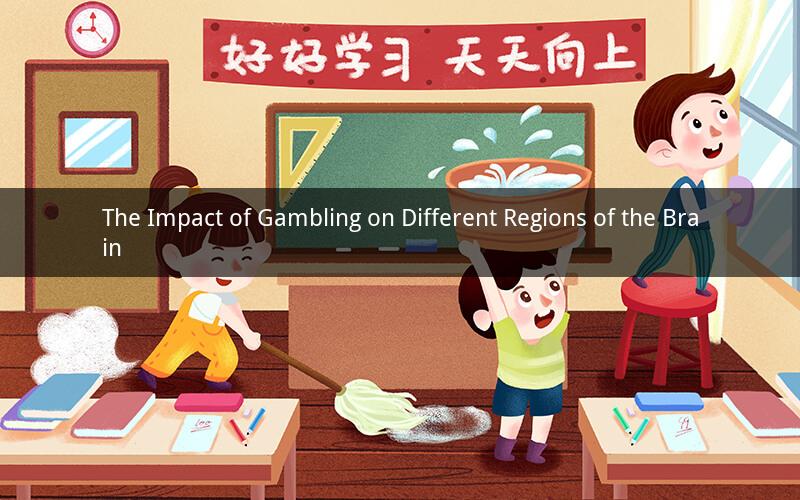
Introduction:
Gambling has long been a popular form of entertainment and leisure activity. However, it is widely recognized that excessive gambling can lead to serious addiction and negative consequences. One of the most intriguing aspects of gambling addiction is its impact on the brain. In this article, we will explore what part of the brain does gambling affect and how it influences an individual's behavior and decision-making process.
1. The Reward System
One of the primary regions of the brain affected by gambling is the reward system. This system is responsible for reinforcing behaviors that are beneficial for survival and reproduction. The reward system includes the ventral tegmental area (VTA), nucleus accumbens (NAc), and prefrontal cortex (PFC).
When a person engages in gambling, the anticipation of winning triggers the release of dopamine in the VTA. Dopamine then travels to the NAc, creating a feeling of pleasure and reward. This reinforcing loop makes gambling a highly addictive activity. Moreover, the prefrontal cortex, which is involved in decision-making and impulse control, becomes less active during gambling, further contributing to the addictive nature of gambling.
2. The Prefrontal Cortex
The prefrontal cortex plays a crucial role in executive functions, such as decision-making, impulse control, and self-regulation. When individuals engage in gambling, the prefrontal cortex becomes less active, which can lead to poor decision-making and increased risk-taking behavior.
The decreased activity in the prefrontal cortex is attributed to the release of dopamine in the reward system. Dopamine inhibits the prefrontal cortex, making it less effective in regulating impulsive behaviors. This can result in a person continuing to gamble despite negative consequences and the potential for addiction.
3. The Amygdala
The amygdala is a brain region responsible for processing emotions and fear. In individuals with a gambling addiction, the amygdala becomes more sensitive to rewarding stimuli, such as winning money. This heightened sensitivity can make the individual more prone to seeking out gambling opportunities and experiencing intense emotions when they do not win.
The increased activity in the amygdala is associated with the release of cortisol, a stress hormone. Chronic stress can exacerbate the negative consequences of gambling addiction, such as financial problems and strained relationships.
4. The Striatum
The striatum, which includes the substantia nigra and globus pallidus, is involved in the brain's reward system and motor control. The substantia nigra contains dopaminergic neurons that play a critical role in regulating dopamine levels in the brain. When an individual engages in gambling, the substantia nigra releases dopamine, leading to the rewarding feelings associated with the activity.
The globus pallidus helps regulate movement and is also involved in the processing of rewards. The increased activity in the striatum during gambling can lead to repetitive behaviors, such as continuous betting, as the individual seeks to recreate the rewarding experience.
5. The Hippocampus
The hippocampus is responsible for memory and spatial navigation. Studies have shown that individuals with gambling addiction exhibit deficits in memory and spatial navigation tasks. These deficits may be attributed to the stress and anxiety associated with gambling addiction, as well as the long-term effects of substance abuse and other risk factors.
Conclusion:
Gambling affects multiple regions of the brain, including the reward system, prefrontal cortex, amygdala, striatum, and hippocampus. These regions work together to influence an individual's behavior and decision-making process, contributing to the addictive nature of gambling. Understanding the neural mechanisms behind gambling addiction can help in the development of more effective prevention and treatment strategies.
Questions and Answers:
1. How does gambling affect the reward system?
Gambling affects the reward system by triggering the release of dopamine in the ventral tegmental area, which then travels to the nucleus accumbens, creating a feeling of pleasure and reward. This reinforcing loop makes gambling a highly addictive activity.
2. Why does the prefrontal cortex become less active during gambling?
The prefrontal cortex becomes less active during gambling because the release of dopamine in the reward system inhibits its function. This makes individuals more prone to poor decision-making and increased risk-taking behavior.
3. How does the amygdala contribute to gambling addiction?
The amygdala becomes more sensitive to rewarding stimuli in individuals with gambling addiction, which makes them more prone to seeking out gambling opportunities and experiencing intense emotions when they do not win.
4. What role does the striatum play in gambling addiction?
The striatum, which includes the substantia nigra and globus pallidus, is involved in the brain's reward system and motor control. The increased activity in the striatum during gambling can lead to repetitive behaviors, such as continuous betting.
5. How does the hippocampus contribute to gambling addiction?
The hippocampus is responsible for memory and spatial navigation. Individuals with gambling addiction exhibit deficits in memory and spatial navigation tasks, which may be attributed to the stress and anxiety associated with gambling addiction, as well as the long-term effects of substance abuse and other risk factors.